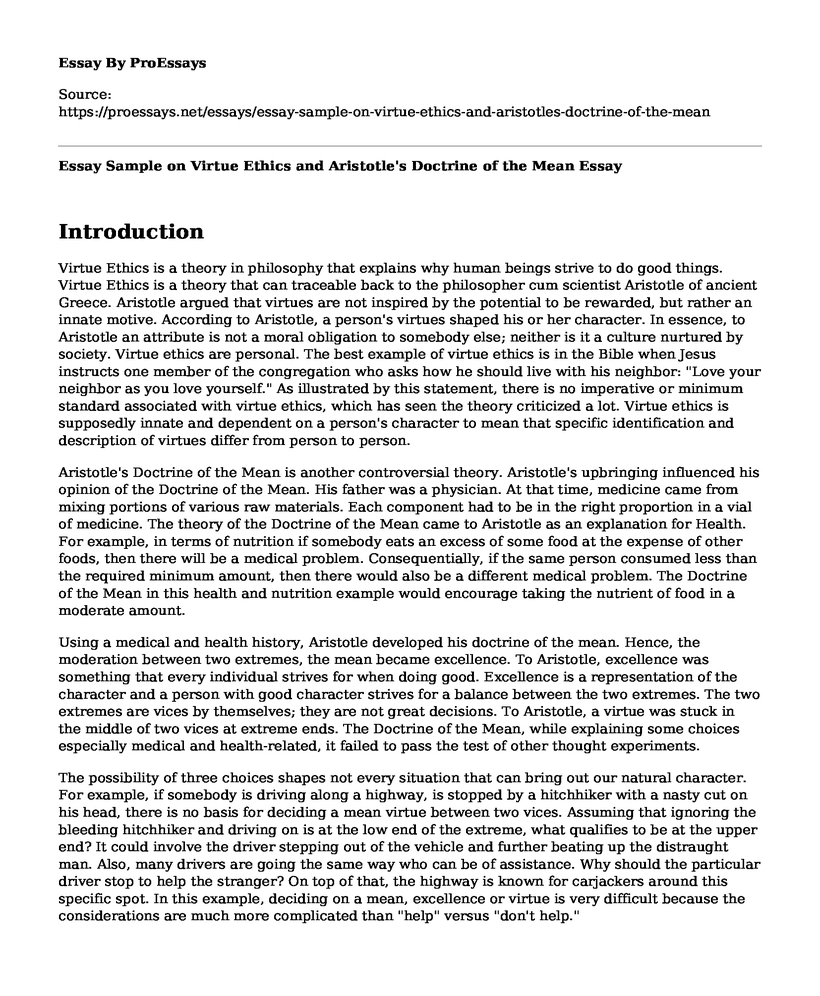Introduction
Virtue Ethics is a theory in philosophy that explains why human beings strive to do good things. Virtue Ethics is a theory that can traceable back to the philosopher cum scientist Aristotle of ancient Greece. Aristotle argued that virtues are not inspired by the potential to be rewarded, but rather an innate motive. According to Aristotle, a person's virtues shaped his or her character. In essence, to Aristotle an attribute is not a moral obligation to somebody else; neither is it a culture nurtured by society. Virtue ethics are personal. The best example of virtue ethics is in the Bible when Jesus instructs one member of the congregation who asks how he should live with his neighbor: "Love your neighbor as you love yourself." As illustrated by this statement, there is no imperative or minimum standard associated with virtue ethics, which has seen the theory criticized a lot. Virtue ethics is supposedly innate and dependent on a person's character to mean that specific identification and description of virtues differ from person to person.
Aristotle's Doctrine of the Mean is another controversial theory. Aristotle's upbringing influenced his opinion of the Doctrine of the Mean. His father was a physician. At that time, medicine came from mixing portions of various raw materials. Each component had to be in the right proportion in a vial of medicine. The theory of the Doctrine of the Mean came to Aristotle as an explanation for Health. For example, in terms of nutrition if somebody eats an excess of some food at the expense of other foods, then there will be a medical problem. Consequentially, if the same person consumed less than the required minimum amount, then there would also be a different medical problem. The Doctrine of the Mean in this health and nutrition example would encourage taking the nutrient of food in a moderate amount.
Using a medical and health history, Aristotle developed his doctrine of the mean. Hence, the moderation between two extremes, the mean became excellence. To Aristotle, excellence was something that every individual strives for when doing good. Excellence is a representation of the character and a person with good character strives for a balance between the two extremes. The two extremes are vices by themselves; they are not great decisions. To Aristotle, a virtue was stuck in the middle of two vices at extreme ends. The Doctrine of the Mean, while explaining some choices especially medical and health-related, it failed to pass the test of other thought experiments.
The possibility of three choices shapes not every situation that can bring out our natural character. For example, if somebody is driving along a highway, is stopped by a hitchhiker with a nasty cut on his head, there is no basis for deciding a mean virtue between two vices. Assuming that ignoring the bleeding hitchhiker and driving on is at the low end of the extreme, what qualifies to be at the upper end? It could involve the driver stepping out of the vehicle and further beating up the distraught man. Also, many drivers are going the same way who can be of assistance. Why should the particular driver stop to help the stranger? On top of that, the highway is known for carjackers around this specific spot. In this example, deciding on a mean, excellence or virtue is very difficult because the considerations are much more complicated than "help" versus "don't help."
Virtue Ethics, as explained by Aristotle was unique in that it did not set the boundaries for society as a whole. While many philosophers such as Kant places imperatives and sets of natural laws above the human condition, Aristotle addresses the source of all decisions; which is rational thought. Aristotle's most significant contribution to philosophy is his use of logic. The Doctrine of the Mean depended on feelings, an innate response by an individual to a particular condition. These feelings influenced one specific action. To Aristotle, virtue did not have to be nurtured as it is innate. A child growing up in a home with parents and siblings does not have to be told it is wrong to kill his parents or injure his siblings. It is something that the child knows automatically. Aristotle was somebody who used logic in his arguments a lot; it may be the norm nowadays, but at that time, it was very revolutionary.
Conclusion
Philosophy has come a long way since Aristotle's Doctrine of the Mean. However, up to now many decisions especially medical and health-related are influenced by Aristotle's theory. For example, many medical situations such as euthanasia because the patient is in pain, or amputating a part of the body such as an arm and leg, seem to be done using the teachings of Aristotle. In any way, virtue ethics and the Doctrine of the Mean shaped philosophy as it is. More importantly, Aristotle emphasized on individualism, where character development is different from one person to another.
Cite this page
Essay Sample on Virtue Ethics and Aristotle's Doctrine of the Mean. (2022, Nov 17). Retrieved from https://proessays.net/essays/essay-sample-on-virtue-ethics-and-aristotles-doctrine-of-the-mean
If you are the original author of this essay and no longer wish to have it published on the ProEssays website, please click below to request its removal:
- Essay Example on Behavioural Modernity: Religion, Music and Dance in Humans
- Essay on Digitalization Divides Society: Generational Gap & Digital Natives/Immigrants
- Social Imagination: A Key to Better Society - Essay Sample
- Essay Sample on Racial Sensitivity: America vs. Other Nations
- Ethics of Duty: Deontology & Immanuel Kant - Essay Sample
- Essay Example on a Blissful Marriage: Watchful yet Enjoyable!
- Modern Health Care: Improved Facilities for Global Well-Being - Essay Sample







